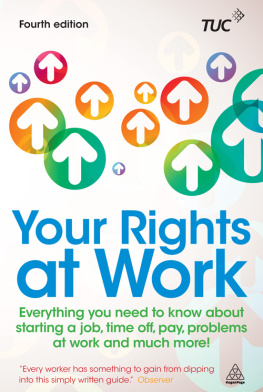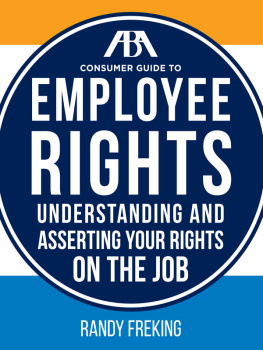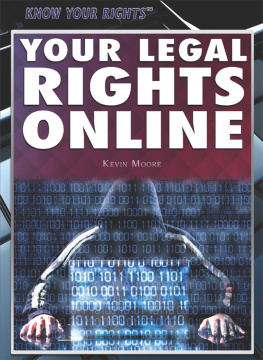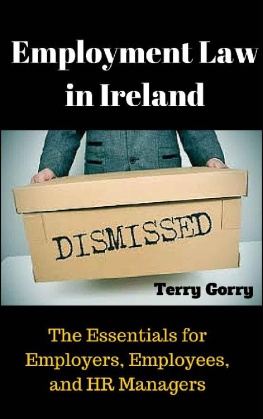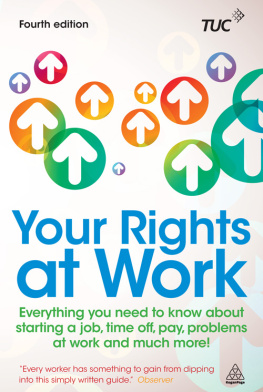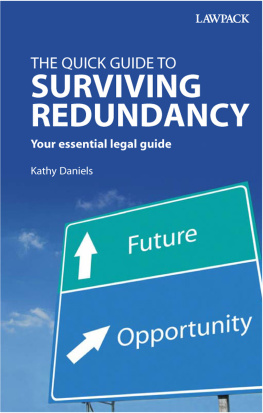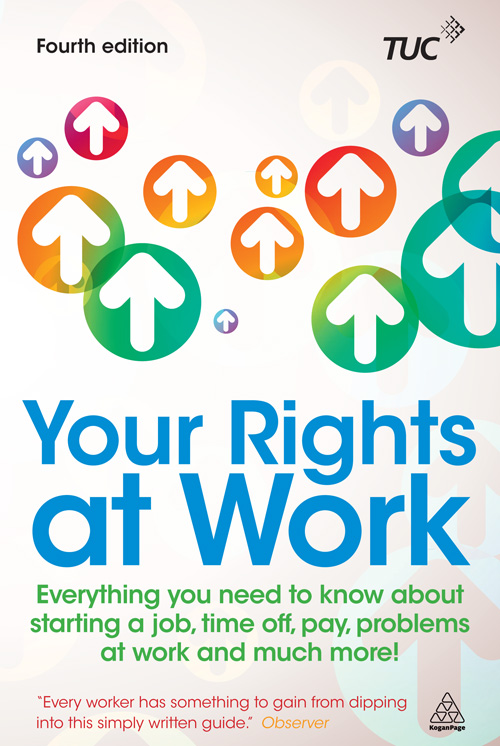Note on the Ebook Edition For an optimal reading experience, please view large
tables and figures in landscape mode. |
This ebook published in 2012 by
Kogan Page Limited
120 Pentonville Road
London N1 9JN
UK
www.koganpage.com
TUC, 2000, 2004, 2008, 2012
E-ISBN 9780749467883
Contents
05 Common problems at work
Foreword
F ew people will go through their working life without needing to know something about employment law. That is not to say that most workplaces are full of abuse or exploitation. Theyre not. Most employers aim to treat their staff fairly, and most succeed most of the time. But even in the best-run organizations, things can go wrong.
That does not mean that anyones first instinct should be to go to court or call a lawyer. Its usually best not to use legal procedures unless all else fails. The law is important because it sets basic standards that no employer can fall below. It gives good employers a starting point on which they can do better, and many do indeed offer contractual rights that are better than the law requires.
Even in non-union workplaces it is generally best to try and resolve issues informally. The knowledge from this book will give you the confidence to make the arguments that can help resolve an issue.
You will not find that this book is a hard sell for union membership, and we have tried to make it useful whether or not you are a union member, or whether or not unions are recognized in your workplace.
But the one advantage of a unionized workplace is that there are likely to be proper procedures for resolving difficult issues. If someone is suffering bullying or harassment, someone will already have worked out what can be done to try and resolve the issue.
In recent years basic legal rights in the workplace have improved. Everyone now takes the national minimum wage for granted, but it is not that old. We were one of the last advanced countries to introduce this basic right, and it was controversial to the last with some who said it would lead to big job losses. Soon we will start to get minimum pension rights too as we begin the long process of auto-enrolling people into a pension to which their employer has to contribute.
Unions have been strong campaigners for these new rights at work, persuading government to legislate for a range of advances.
Nor should we leave the European Union out of the equation. Thanks to coordinated union campaigning across Europe we have holiday rights, parental leave, rights for part-timers, an end to discrimination based on age, sexuality or religion and most recently basic rights for agency workers. Europe does not always get a good press, but it has often proved easier to argue for minimum standards at work that apply across Europe rather than changes that benefit workers in only one country.
But in this, the fourth edition of Your Rights at Work , for the first time we are starting to report rights that have been lost, are getting weaker or are under threat.
Almost every advance in employment rights has been opposed by at least some employers and those on the political right. We are told it will be bad for the economy, cause needless red tape and anyway most employers will do the decent thing.
We can go back to the 19th century and find similar arguments made against laws that prevented children working and sometimes dying as chimney sweeps. Lord Lauderdale told the House of Lords when opposing such a law that change should be left entirely to the moral feelings of perhaps the most moral people on the face of the earth. But unfortunately we have learnt through the years that not every UK employer would win a global morality contest.
The argument that stripping away rights is good for the economy fails to stand up. Even after the welcome reforms of recent years, the United Kingdom comes low down the international league table for rights at work. Countries with much better standards have higher standards of living and fewer people unemployed. Our country has been very badly damaged by the banking crisis, but it is absurd to think that making it easier to sack people or reducing maternity leave is the route to economic growth.
But it is not all bad news. Even this government has improved some rights at work. Sometimes this is because European law has forced them too against their wishes, but on other issues such as ending statutory retirement ages or improving the right to request flexible working they have done better than the previous government and on pensions auto-enrolment they have continued what is now a welcome all-party consensus, albeit put back by a year.
It is important to understand what this book is and what it isnt. Our purpose is to provide a general introduction to your rights at work, but it is not a legal textbook. To keep things relatively clear we have had to simplify some issues. We have not covered some situations or exemptions that affect only a very few people at work.
You cannot rely on this book therefore as expert legal advice that automatically covers your situation. What it aims to do is explain the general requirements of the law in a way that can tell anyone with a problem whether it is worthwhile taking further advice.
As we write, we already know of some changes to employment law that are in the pipeline, though not their detailed shape. Some are good news, while some take us backwards. New test cases or European judgements can change how a well-established law is interpreted overnight. All this means that you should always take detailed advice on your own situation, not rely on what is in this book.
One difference between the first and later editions of this book is that we have now launched work SMART , the TUC world of work website. This contains up-to-date information not just on employment rights but on health and safety and pensions as well. For those wanting to join a union, it also features a union finder that can help identify the most appropriate union. You can find work SMART at www.worksmart.org.uk .
Throughout the book you will find some case studies of tribunal and court hearings. These are based on real cases, and employment law experts will no doubt recognize some of them. We have, however, simplified them where necessary, and changed the names involved. You will also find references to amounts of money, such as the current level of the minimum wage or the earnings limit for National Insurance contributions. The figures given are for 2011, but may well have been uprated by the time you read this. Normally, figures go up a few per cent a year, often in line with inflation.
Many TUC staff have contributed to this book over the years, and they are too numerous to thank individually, but I would like to record the work of Linda Stewart, Partner and Head of Employment at Simpson Millar LLP, who has updated many parts of the text for this fourth edition.
Brendan Barber
TUC General Secretary
Introduction
Your basic rights
Everyone at work is protected by a series of basic legal rights some old and some new. Some protect you against the worst kinds of exploitation and unfair treatment. Some give you positive rights that provide some choice, and some voice, in your working life. And some are there to ensure that your employer keeps their side of the basic bargain at the heart of any job you work and in return you get paid and receive other benefits.

